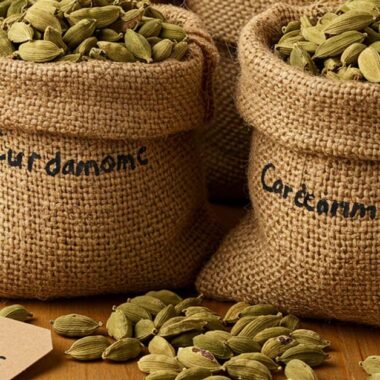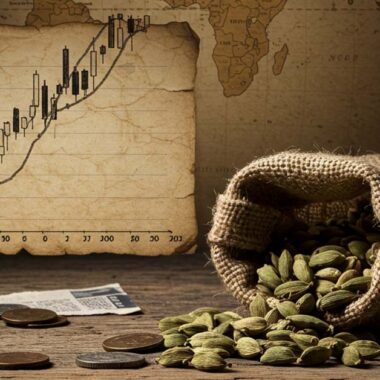As the world continues to face the challenges of climate change, resource depletion, and a growing demand for high-quality, eco-friendly agricultural products, the future of sustainable cardamom farming looks brighter than ever. Farmers are increasingly turning to practices that not only benefit the environment but also ensure long-term profitability. With organic farming, agroforestry, and innovative technologies taking center stage, the future of cardamom farming is evolving in exciting and sustainable ways. 🌿
In this blog, we will explore how sustainable practices are shaping the future of cardamom farming and why these practices are crucial for both farmers and the planet.
🌍 Why Sustainability in Cardamom Farming is Crucial 🌱
The demand for high-quality cardamom is steadily rising due to its culinary, medicinal, and aromatic uses. However, the impact of traditional farming methods on the environment and the challenges posed by climate change require a shift towards more sustainable practices. Sustainable farming not only focuses on boosting productivity but also aims to protect soil health, biodiversity, and natural resources for future generations.
Key Drivers for Sustainable Cardamom Farming:
- Climate Change: Rising temperatures, erratic rainfall, and changing weather patterns directly affect cardamom crops. Farmers are adopting sustainable practices to adapt to these changes and protect their crops from unpredictable weather events.
- Soil Degradation: Conventional farming methods often lead to soil depletion and erosion. By adopting sustainable practices, cardamom farmers can improve soil health and ensure long-term fertility.
- Consumer Demand for Organic Products: There is a growing global market for organic cardamom, driven by health-conscious consumers seeking products that are free from synthetic chemicals and grown using eco-friendly methods.
🌱 Key Sustainable Practices for Cardamom Farming 🌱
1. Agroforestry: Combining Cardamom with Trees 🌳
Agroforestry, the practice of integrating trees with crops, is gaining popularity in cardamom farming. By planting shade trees alongside cardamom plants, farmers create a more resilient and biodiverse farming ecosystem. This practice benefits cardamom crops in several ways:
- Microclimate Creation: The trees provide shade, which helps maintain optimal temperatures for cardamom plants and reduces the effects of heat stress.
- Soil Fertility: Fallen leaves and organic matter from trees enrich the soil with essential nutrients, improving its fertility.
- Biodiversity Enhancement: Agroforestry promotes biodiversity by supporting a variety of plant and animal species, helping to create a balanced ecosystem.
2. Organic Farming: Going Chemical-Free 🌿
Organic farming is a key pillar of sustainable agriculture. As cardamom grows well in tropical and subtropical climates, which often rely on pesticides and synthetic fertilizers, moving to organic practices is essential to safeguard the environment and consumer health.
Key organic practices for sustainable cardamom farming include:
- Composting: Using compost to enhance soil fertility and reduce the need for synthetic fertilizers.
- Natural Pest Control: Employing natural predators, such as ladybugs or neem oil, to control pests, instead of relying on harmful chemical pesticides.
- Crop Rotation: Rotating crops to prevent soil depletion and reduce the risk of pests and diseases.
- Soil Conservation: Practices like mulching and cover cropping help improve soil structure and prevent erosion.
3. Water Conservation Techniques 💧
Water scarcity is a major concern for farmers worldwide, and cardamom is no exception. Being a water-intensive crop, cardamom farming needs to adopt sustainable water management techniques to ensure the crop’s long-term survival. Some effective methods include:
- Drip Irrigation: A highly efficient irrigation system that delivers water directly to the roots of the plants, minimizing water wastage.
- Rainwater Harvesting: Collecting and storing rainwater to reduce reliance on groundwater and irrigation systems.
- Soil Moisture Management: Using organic mulch to retain moisture in the soil, reducing the need for frequent irrigation.
4. Climate-Smart Agriculture 🌡️
As climate change continues to impact global agriculture, climate-smart agriculture (CSA) is becoming a critical approach for cardamom farmers. CSA focuses on strategies that help farmers adapt to climate change while ensuring food security and environmental sustainability. For cardamom, this could include:
- Drought-Tolerant Varieties: Researching and developing cardamom varieties that are more resilient to extreme weather conditions.
- Diversified Farming Systems: Introducing other crops alongside cardamom to spread risks and increase overall resilience to climate fluctuations.
- Weather Forecasting and Planning: Using technology to predict weather patterns and make informed decisions about planting and harvesting.
5. Sustainable Certification and Market Access 🛒
With growing consumer demand for sustainable and certified organic products, cardamom farmers can benefit from obtaining certifications like Fair Trade or Organic Certification. These certifications not only help improve the marketability of their products but also ensure that the farming methods used are environmentally friendly and socially responsible.
By adhering to sustainable farming practices, farmers can tap into the premium markets for organic and ethically produced products, ensuring better income and profitability.
🌍 The Future of Cardamom Farming: Innovations on the Horizon 🌱
The future of sustainable cardamom farming is bright, with new innovations on the horizon that will drive efficiency, increase yields, and protect the environment.
1. Technology in Farming 🤖
The use of drones, sensors, and AI is revolutionizing sustainable farming. Farmers are now able to monitor crop health in real-time, optimize water usage, and detect pests early, all while reducing their carbon footprint. These technological advancements will likely play a significant role in the future of cardamom farming, helping farmers make data-driven decisions that promote sustainability.
2. Circular Economy Practices 🔄
As the demand for sustainable practices increases, more cardamom farmers are likely to adopt circular economy principles. This approach focuses on reducing waste and ensuring that resources are used efficiently. For example, cardamom byproducts, such as dried cardamom pods, could be reused for natural fertilizers or essential oils, contributing to a more sustainable and profitable farming model.
3. Increased Research and Collaboration 🧑🔬
Collaboration between farmers, researchers, and environmental organizations is essential to the future of sustainable cardamom farming. Research into drought-resistant cardamom varieties, soil health improvements, and sustainable pest management techniques will continue to evolve, making it easier for farmers to adopt sustainable practices and increase yields while protecting the environment.
🌱 Conclusion 🌱
Sustainable cardamom farming is not just a trend but a necessity for the future of the industry. As global demand for cardamom rises, and environmental challenges become more pressing, it is vital for farmers to adopt practices that support long-term sustainability. Through organic farming, water conservation, agroforestry, and technological advancements, cardamom farmers can create a resilient and profitable farming system that benefits both people and the planet.
At Greengold Guide, we are committed to supporting sustainable practices in cardamom farming. 🌍 By promoting environmentally friendly and socially responsible methods, we aim to ensure that cardamom farming thrives for generations to come.
🔗 Discover premium, sustainable cardamom from Greengold Guide here












